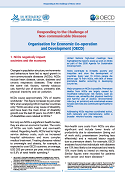Health policies and data
Public Health
|
Changes in the population structure, evolving disease patterns, increasing health inequalities and a transforming environment challenge health systems. Although smoking has been declining in many OECD countries, unhealthy diets, sedentary lifestyles, hazardous alcohol use and other risk factors have spread widely, driving non-communicable diseases and mortality. To address these issues, OECD works to support the development of well-concerted population approaches under strong public health systems. Our work explores major risk factors including obesity, diet, physical activity, alcohol consumption, tobacco and environmental risks. We study the spread of these risk factors in populations, past and projected future trends, inequalities by socioeconomic status and the determinants underpinning these risk factors. Moreover, we identify effective and efficient policies to tackle risk factors and prevent major non-communicable diseases (NCDs). We produce evidence of the health and economic impacts of alternative approaches, through modelling and identification of best practices. |
 |
Antimicrobial resistance |
Obesity, unhealthy diet and physical inactivity
|
|
Best practices in public health |
|
|
Harmful alcohol consumption
|
Pollution and environment
|
|
Health promotion
|
Public health reviews
|
MODELLING WORK IN PUBLIC HEALTH: THE OECD’S SPHEP MODELS
 |
|
UNIATF/OECD WORK ON Responding to the Challenge of NCDs
 |
The OECD is one of the 42 intergovernmental organisations part of the United Nations Inter-Agency Task Force on the Prevention and Control of Non-communicable Diseases (UNIATF). UNIATF was established in 2013 to coordinate the activities of the UN System and other relevant intergovernmental organisations to support the realisation of the commitments made by Heads of State and Government in the 2011 Political Declaration on NCDs. Joint activities included in the work plan of the Task Force are additive to various, more comprehensive efforts conducted by the individual organisations to prevent and control NCDs. These joint activities offer important opportunities to address cross-cutting issues and to advance capacity and learning in countries.
|
Data on PUBLIC HEALTH WORK
- Latest Obesity Update (May 2017)
- Alcohol consumption
- Daily smokers
- Overweight or obese population (measured and self-reported)
Related PROJECTS AND documents
- Establishing an EU-wide front-of-pack nutrition label: Review of options and model-based evaluation, Obesity Reviews (February 2024)
- Health at a Glance 2023 - OECD Indicators: read chapter 4 on Risk factors for health (November 2023)
- Economics of Public Health and Health Promotion
- Non-Communicable Diseases (NCD)
OECD Health Working Papers
- No. 155 - Évaluation du programme national de lutte contre le tabagisme en France (June 2023) - in French only, English version to be released soon
- No. 136 - Antimicrobial resistance in long-term care facilities (February 2022)
- No. 133 - Cluster analysis to assess the transferability of public health interventions (May 2022)
- No. 132 - Modelling life trajectories of body-mass index (November 2021)
- No. 112 - Current and past trends in physical activity in four OECD countries: Empirical results from time use surveys in Canada, France, Germany and the United States (June 2019)
- No. 109 - Exploring the causal relation between obesity and alcohol use, and educational outcomes (April 2019)
- No. 101 - How much do OECD countries spend on prevention? (December 2017)
- No. 100 - Diet, physical activity and sedentary behaviours (December 2017)
- No. 86 - The Labour Market Impacts of Obesity, Smoking, Alcohol Use and Related Chronic Diseases (November 2015)
- No. 80 - Assessing the Impacts of Alcohol Policies: A Microsimulation Approach (May 2015)
- No. 79 - Alcohol Consumption and Harmful Drinking: Trends and Social Disparities Across OECD Countries (May 2015)
- No. 66 - The Role of Fiscal Policies in Health Promotion (December 2013)
- Toward a New Comprehensive International Health and Health Care Policy Decision Support Tool (December 2012)
- No. 48 - Improving Lifestyles, Tackling Obesity: The Health and Economic Impact of Prevention Strategies (November 2009)
- No. 46 - Education and Obesity in Four OECD Countries (June 2009)
- No. 45 - The Obesity Epidemic: Analysis of Past and Projected Future Trends in Selected OECD Countries (March 2009)
- No. 32 - The Prevention of Lifestyle-Related Chronic Diseases: an Economic Framework (March 2008)
CONTACT
For more information, please contact health.contact@oecd.org

Follow us on Twitter @OECD_Social
Related Documents